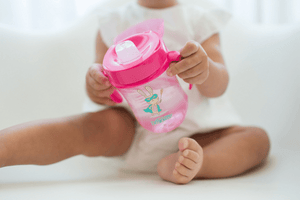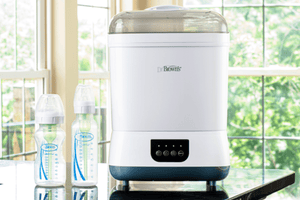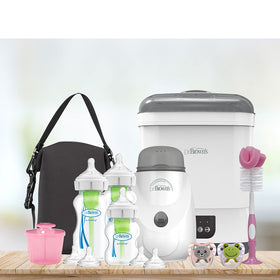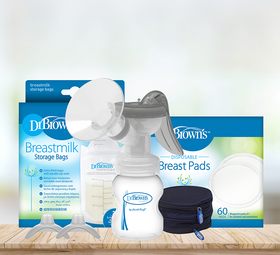
7 Gentle Ways to Help Your Baby Sleep Longer At Night
When Sleep Feels Out of Reach
It’s 2 a.m., and you can hear it again. That cry that pierces through the night. You wait, hoping it will fade, but it only grows louder… Until you’re out of bed again, rocking, patting, whispering the same soft words you said an hour ago
Your arms ache, your eyes sting, and you find yourself wondering if you’ll ever get more than two hours of rest in a row. You’re not alone, every new parent knows the exhaustion that comes from endless night waking.
The good news? Your baby’s still learning, and their sleep patterns can (and will) improve. With patience and a few gentle, consistent habits, you can help your little one sleep longer and more peacefully through the night.
This mini guide from Dr Brown’s Australia shares science-backed, parent-approved techniques designed to calm, comfort, and nurture better rest for you and baby.
Why Babies Wake Often?
Newborns have short sleep cycles, around 40 to 60 minutes, meaning they drift between light and deep sleep more often than adults. It’s completely normal for babies to wake several times a night, especially for feeding or reassurance.
Growth spurts, teething, overstimulation, or discomfort from gas can also interrupt sleep. As your baby’s brain and body mature, these cycles gradually lengthen.
7 Ways To Help Your Baby Sleep Longer
1. Create a Predictable, Soothing Routine
Babies love predictability; it tells their bodies it’s time to rest.
A simple bedtime routine helps regulate their internal clock and prepares them for longer sleep stretches.
A calm routine might look like:
Warm bath → Feed → Cuddle → Lullaby → Bedtime.
Keep lighting soft, voices low, and movements gentle. Over time, your baby learns these cues mean sleep is coming, and their body naturally begins to relax.
Consider using Dr Brown’s Soothing Range, such as soft pacifiers or teething aids, to help your baby wind down comfortably.
2. Set the Ideal Sleep Environment
Your baby’s sleep space matters just as much as their routine.
According to Red Nose Australia, safe sleep means placing the baby on their back, on a firm mattress, with no loose bedding.
-
Room temperature: Keep between 20–22°C.
-
Lighting: Dim or use a soft red night light (not bright white or blue).
-
Noise: Use gentle white noise to mask household sounds.
-
Safety: No loose blankets or toys — just a fitted sheet on a firm mattress.
3. Feed Calmly, Not Sleepily
Many night wakings stem from hunger or discomfort during feeding. To prevent this, focus on calm, fully awake feeds before bedtime. Try dimming lights and minimising distractions during the last feed of the evening.
Gas or air bubbles can make babies restless after feeding. Use Dr Brown’s Options+™ Anti-Colic Bottles to reduce swallowed air during feed, and ease tummy tension. This will allow your baby to sleep more peacefully.
4. Help Baby Release Gas Before Sleep
Trapped gas is one of the most common causes of midnight wake-ups.
Before putting baby down, take a few minutes for gentle burping or tummy massage to release trapped air.
Try this:
-
Hold baby upright and rub their back in slow circles.
-
Gently “bicycle” their legs to stimulate digestion.
-
Offer tummy time after feeds during the day to strengthen core muscles.
Dr Brown’s vented bottles can help prevent gas build-up, making both feeding and sleeping calmer for everyone.
Related reading: “How to soothe a gassy baby”.
5. Recognise Sleep Cues Early
Babies often need to sleep every 60–90 minutes during the day. So catching sleepiness before overtiredness sets in is key. Some early signs your baby is ready for sleep include:
-
Yawning
-
Rubbing eyes or ears
-
Glazed or distant stare
-
Fussing or turning away from stimulation
Try to start your bedtime routine at the first signs of tiredness. Once overtired, babies produce stress hormones that make falling asleep (and staying asleep) much harder.
6. Comfort Without Overstimulation
When your baby wakes, respond gently, but keep stimulation low.
Avoid bright lights or playful chatter. Instead, try:
-
Light patting on their chest or back
-
Soft “shh-shh” sounds
-
Gentle rocking in your arms or crib
Responsive, calm reassurance teaches your baby that nighttime is for resting, not playing.
Over time, they’ll learn to settle more easily on their own.
7. Nurture With Healthy Daytime Habits
Daytime habits shape nighttime sleep more than many parents realise.
Ensure your baby gets:
-
Plenty of daylight exposure (especially morning sun)
-
Short, regular naps appropriate for age
-
Engaging playtime between naps to build healthy tiredness
Predictable daytime rhythms make nights more restful. Think: feed, play, nap, repeat.
Realistic Expectations for Baby Sleep
Every baby is different. Some sleep six hours straight by month 3, others take a year to reach that milestone.
Progress looks different for everyone, and that’s perfectly okay.
Focus on gentle consistency, not perfection.
As Australian health professionals remind us: “Babies’ sleep improves naturally as they grow,
Helping your baby sleep longer isn’t a “quick fix.” It’s about creating calm, predictable moments that signal safety and rest.
And if you need support with the best feeding and soothing products designed for calmer days and restful nights….
👉 Explore Dr Brown’s Soothing and Feeding Range
FAQs
Q1: When will my baby start sleeping through the night?
Ans: Most babies begin sleeping longer stretches (4–6 hours) between 4–6 months, but it varies widely.
Q2: Should I feed or resettle when my baby wakes?
Ans: If it’s been several hours since the last feed, feeding is fine. If the baby ate recently, try gentle settling first.
Q3: Is white noise safe for babies?
Ans: Yes — as long as it’s kept below 50 decibels (about the volume of a shower) and away from the cot.
Q4: Can anti-colic bottles improve sleep?
Ans: Absolutely. By reducing trapped air and gas, vented bottles like Dr Brown’s Options+™ can help your baby sleep longer between feeds.







